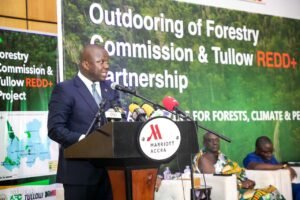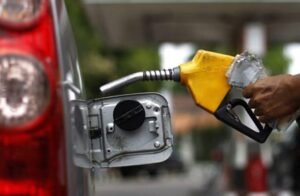
Former Energy Minister John Peter Amewu inspect solar panels
President Nana Addo Dankwa Akufo-Addo’s decision to reduce government’s expenditure on utilities and also promote the use of solar power for government and public buildings has been given a boost with the installation of a 912 kilowatt solar power plant at the presidency.
Delivering his 3rd State of the Nation Address on February 21, last year, the President said the move is part of government’s decision to gradually move all government buildings to solar energy.
“To reduce government’s expenditure on utilities, and also promote the use of solar power for government and public buildings, the Ministry of Energy initiated the Solar Rooftop Programme. The Ministry is leading by example with the installation of a 65-kilowatt solar rooftop system at its premises.
The project, which is expected to be completed by July this year, is to provide about 60 per cent of the energy needs of the Jubilee House.
The project, costing US$1.4 million, is being executed by a Ghanaian based company, Strategic Security Systems Limited,” the President said.
Steady progress
Inspecting ongoing works at the project site on Friday, Peter John Amewu, the Minister of Energy, expressed satisfaction with the progress of work.
“Having visited the site, I am very much impressed about the progress on site. This work is part of the government’s agenda towards inclusion of renewable energy in our energy mix. As a government, we believe in the importance of renewable. We have a target of 10 per cent as a proportion of our energy mix within 2020,” he said.
Already, photovoltaic panels have been installed on the entire roof of the General Services Building and the Presidential Villa at Jubilee House.
The scope of work includes the installation of solar PV panels with all supporting infrastructure, excluding battery storage.
Ghana to go green
Mr Amewu is optimistic that the country will soon join the list of countries extensively using renewable energy, given the number of renewable projects that will start soon.
He mentioned the 45Kw Tsatsadu mini hydro power project in the Volta Region, which is expected to be commissioned, as well as the 17mw solar panel project at Kaleo to justify the determination of government believe in renewables.
The Minister was accompanied on the tour by Joseph Cudjoe, Deputy Minister of Energy; Benjamin Asante, director of Renewables and Alternative Energy; Seth Mahu, director of Upstream at the Energy Ministry, among others.


